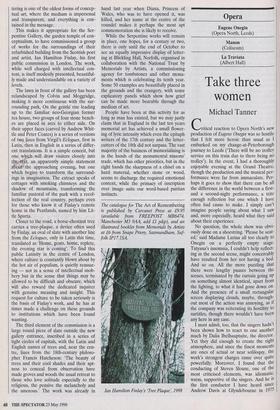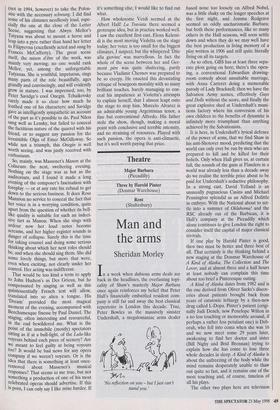Opera
Eugene Onegin (Opera North, Leeds) Manon (Coliseum) La Traviata (Albert Hall)
Take three women
Michael Tanner
Critical reaction to Opera North's new production of Eugene Onegin was so hostile that I felt more heroic than usual as I embarked on my change-at-Peterborough journey to Leeds (`There will be no trolley service on this train due to there being no trolley'). In the event, I had a thoroughly enjoyable evening at the Grand Theatre, though the production and the musical per- formance were far from immaculate. Per- haps it goes to show that there can be all the difference in the world between a first- and a second-night performance, a trite enough reflection but one which I have often had cause to make. I simply can't imagine people saying about what I saw and, more especially, heard what they said about their experience.
No question, the whole show was obvi- ously done on a shoestring. 'Please be seat- ed,' said Madame Larina all too clearly to Onegin on a perfectly empty stage. Tatyana's insomnia, I couldn't help reflect- ing in the second scene, might conceivably have resulted from her not having a bed. And so on. All the more puzzling that there were lengthy pauses between the scenes, terminated by the curtain going up on something almost identical, apart from the lighting, to what it had gone down on. And the presence of a small rectangular screen displaying clouds, maybe, through- out most of the action was annoying, as if the company was reiterating its hostility to surtitles, though there wouldn't have been any here in any case. I must admit, too, that the singers hadn't been shown how to react to one another much by Dalia Ibelhauptaite, the director. Yet they did enough to create the right atmosphere, and since the finest moments are ones of actual or near soliloquy, the work's strongest charges came over quite powerfully. Moreover, I found that the conducting of Steven Sloane, one of the most criticised elements, was idiomatic, warm, supportive of the singers. And he is the first conductor I have heard since Andrew Davis at Glyndebourne in 1975 (not in 1994, however) to take the Polon- aise with the necessary schwung. I did find some of his climaxes needlessly loud, espe- cially the one at the close of the Letter Scene, suggesting that Alwyn Mellor's Tatyana was about to mount a horse and leap into a pyre rather than hand her letter to Filipyevna (excellently acted and sung by Frances McCafferty). The great scene itself, the raison d'être of the work, was mainly very moving; no one would rank Mellor, yet, among the unforgettable Tatyanas. She is youthful, impetuous, sings many parts of the role beautifully, ages grandly and convincingly, and will evidently grow in stature. I was impressed, too, by Peter Savidge's cool Onegin. Tchaikovsky rarely made it so clear how much he loathed one of his characters; and Savidge gave as intelligently sympathetic an account of the part as it's possible to do. Paul Nilon sang well as Lensky, but failed to conceal the factitious nature of the quarrel with his friend, or to suggest any passion for the irresistible Olga of Emer McGilloway. So while not a triumph, this Onegin is well worth seeing, and was justly received with enthusiasm.
So, mainly, was Massenet's Manon at the Coliseum the next, sweltering evening. Nothing on the stage was as hot as the auditorium, and I found it made a long evening of the composer's fascination with foreplay — or at any rate his refusal to get down to the serious business. It does Rose Mannion no service to conceal the fact that her voice is in a worrying condition, quite apart from the question of whether its bell- like quality is suitable for such an indeci- sive tart as Manon. When she sings with ardour now her loud notes become screams, and her higher register sounds in danger of collapse. Surely this is the time for taking counsel and doing some serious thinking about which her next roles should be, and when she should sing them. She did some lovely things, but more that were, even when exciting, not clearly under her control. Her acting was indifferent. That would be too kind a term to apply to John Hudson's as Des Grieux, but he compensated by singing as well as this quintessentially French text will allow, translated into so alien a tongue. His Dream' provided the most magical moment of the evening, accompanied with Beechamesque finesse by Paul Daniel. The staging, often interesting and resourceful, in the end bewildered me. What is the Point of the immobile (mostly) spectators sitting as if at a bull-fight, of the Lulu-like voyeurs behind each piece of scenery? Are we meant to feel guilty at being voyeurs too? It would be bad news for any opera company if we weren't voyeurs. Or is the idea that there is something at least once- removed about Massenet's musical responses? That seems to me true, but not something a production of one of his most celebrated operas should advertise. If this is porn, I can only say I like mine harder. If it's something else, I would like to find out what.
How wholesome Verdi seemed at the Albert Hall! La Traviata there seemed a grotesque idea, but in practice worked well. I saw the excellent first cast. Elena Kelessi- di is the most moving Violetta on the stage today; her voice is too small for the biggest climaxes, I suspect, but the whispered Dite alla giovine' was marvellous. In fact the whole of the scene between her and Ger- mont pere was quite shattering, partly because Vladimir Chernov was prepared to be so creepy. He enacted this devastating critique of bourgeois morality with so many brilliant touches, barely managing to con- ceal his impatience at Violetta's attempts to explain herself, that I almost leapt onto the stage to stop him. Marcelo Alvarez is an admirable young Argentinian tenor, a fine but conventional Alfredo. His father stole the show, though, making a moral point with conclusive and terrible intensity, and no straining of resources. Played with such passion, the opera is anti-climactic, but it's well worth paying that price.



































































 Previous page
Previous page